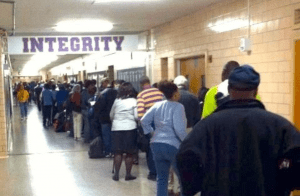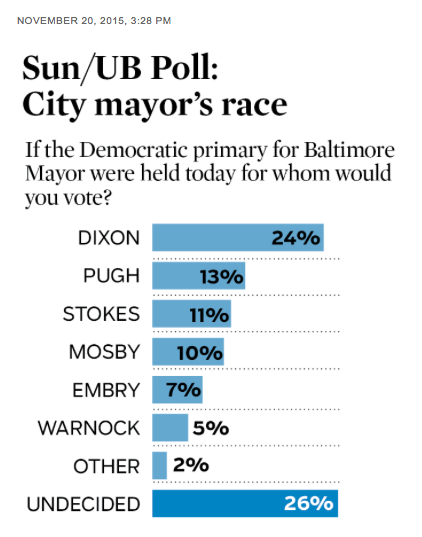 Hi. Even this far in advance of next April’s primary, there was considerable interest among people who follow city politics when The Sun published its recent poll. The image below from The Sun’s website shows the results.
Hi. Even this far in advance of next April’s primary, there was considerable interest among people who follow city politics when The Sun published its recent poll. The image below from The Sun’s website shows the results.
The fact that Ms. Dixon is leading by a significant margin is more about name recognition than an indication of any real, unwavering commitment on the part of the likely voters who were interviewed. Senator Catherine Pugh is unquestionably the second best known candidate on the list, followed by Councilman Carl Stokes, Councilman Nick Mosby, senior state government attorney Elizabeth Embry and venture capitalist David Warnock. The results are literally a list of candidates based on name recognition in descending order.
No matter how clever the pollster and well-crafted the question, Ms. Dixon’s lead is almost certainly a baseline result that reflects the fact that she has twice run and won citywide, first as President of the City Council and then Mayor. Senator Pugh has run one citywide race, having come in second behind Mayor Rawlings-Blake in 2011.
Ironically, the fact that Ms. Dixon left office prematurely as part of a plea agreement that kept her out of jail has probably given her a level of long-lasting name recognition that’s pumped her up in this early poll. For now, some people in the sample of 398 respondents no doubt feel that they know her – even if they can’t remember exactly why. “Whatever she did, how bad could it be given that she’s running again?” so some of them may be thinking.
 The notion that she deserves a second chance will not likely hold up well after her opponents begin campaigning in earnest. Baltimore is a city of good, forgiving people. Even so, three or four months from now, sympathetic voters may prefer to encourage Ms. Dixon as she undertakes her next career, whatever that turns out to be, but it’s not likely they’ll be electing her Mayor.
The notion that she deserves a second chance will not likely hold up well after her opponents begin campaigning in earnest. Baltimore is a city of good, forgiving people. Even so, three or four months from now, sympathetic voters may prefer to encourage Ms. Dixon as she undertakes her next career, whatever that turns out to be, but it’s not likely they’ll be electing her Mayor.
While their transgressions were very different, Baltimore cannot afford its own version of Washington’s Marion Barry. A lucrative consulting position perhaps, or a taco stand maybe, but Ms. Dixon has had her chance to be Mayor. Re-electing Ms. Dixon, given her history, is not the message Baltimore needs to send to families and especially to employers who are thinking about moving to the city – bringing with them the jobs that Baltimore’s un- and under-employed so desperately need.
While her lead is impressive, there’s a flipside to it. Ms. Dixon get’s 24% of the sample’s support – a result which is subject to a 4.9% margin of error either way. Impressive, but what it really indicates is that a substantial 76% majority of the respondents are not currently interested in returning her to office. 26% of those 76% are undecided. The only reason she has a lead is that there are 5 other prominent candidates running with less widespread, less enduring name recognition. “Prominent” doesn’t mean qualified. It means that they are either well known enough and/or sufficiently well funded to get a significant number of votes.
Problem… With six prominent candidates and no incumbent running, it’s at least technically possible that one of them could win with less than 20% of the vote. Given that less than 15% of registered Democrats showed up for the last Presidential primary in 2012, that would mean that the next Mayor could be elected with the support of just 3% of the electorate. And that’s no mandate, no basis for managing a city, particularly a great city like Baltimore in crisis.
Admittedly, those are extreme numbers. The last Mayoral primary in 2011 had a turnout of 25% – 10 points higher than in 2012, but still pathetic. And both Mayor Rawlings-Blake and former Mayor Dixon received a clean majority of over 50% of the vote when they ran ¬– both of them as incumbents. Ms. Dixon took over when then Mayor O’Malley was elected Governor. Mayor Rawlings-Blake became Mayor when then Mayor Dixon was forced out of office.
Whatever the actual numbers next April, Baltimore’s new Mayor, Council and representatives in Annapolis should encourage changes in election law that force a runoff in the event that no candidate receives a majority of the vote. Think about it. With all we have at stake given the condition of the city, do you really want the next Mayor to be elected without at least majority support from that relative handful of registered voters who bothered to show up?

